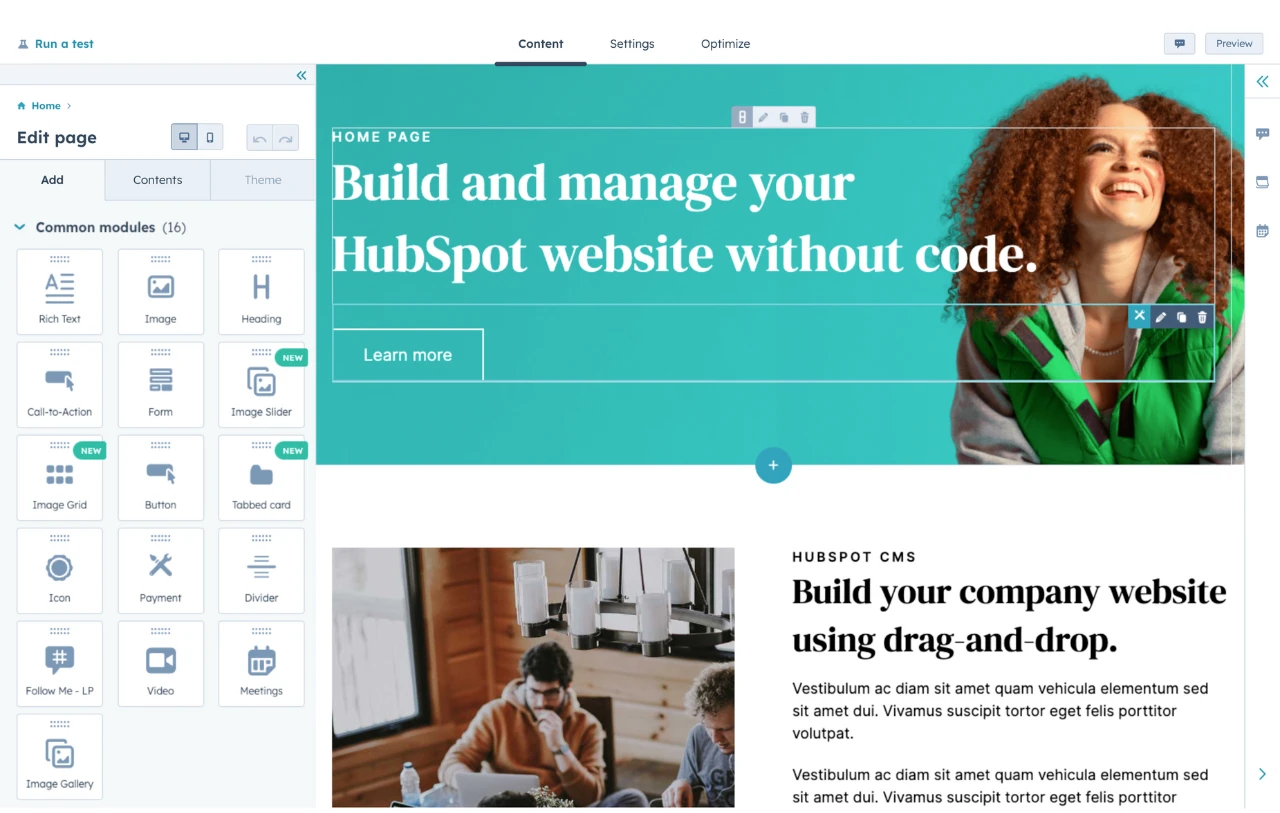Most likely, you’ve already decided to go with WordPress, the most popular CMS in the world. But if you’re a beginner, you’re likely mistaken about one major thing: A CMS is different from a web host, which is different from a website builder. No worries — I’ll explain it all below.
In this post, I’ll share everything you need to know about the best blog hosting sites. You’ll discover what a web host is and why you might want to go with an all-in-one web host/CMS/website builder (and why you might not want to). Then, I’ll detail 13 of the best hosting sites for blogs.
Table of Contents
- Blog Host (Self-Hosted) vs. Blogging Platform (Hosted): Pros and Cons
- Things to Watch Out for When Buying From Blog Hosting Sites
- My Criteria for Evaluating the Best Blog Hosting Sites
- Best Hosting Sites for Blogs: Paid
- Best Hosting Sites for Blogs: Free
- How to Choose a Blog Hosting Service to Launch Your Blog
Blog Host (Self-Hosted) vs. Blogging Platform (Hosted): Pros and Cons
If you’re just starting a blog, you must first be clear about what you mean by a “blog hosting site.” Are you looking for a blog host (AKA a web host), or are you looking for an all-in-one blogging platform? Yes, there’s a difference.
To launch a blog, you need three components:
- Domain
- Content management system (CMS)
- Hosting
Blog Host (Self-Hosted Blog)
Examples of blog hosts: Bluehost, SiteGround, and HostGator
A blog host takes care of point three for you: It will provide server space for your content to live on, for a fee. Some blog hosts even offer domains for an extra fee. If not, however, you must buy a domain from a domain registrar and connect it to your web host.
If you go with a blog host, you will buy hosting (server space) from a web host and connect your domain to it. Then, you’ll need to install a CMS to build and manage your blog. For most bloggers, this means installing open-source WordPress, which is free.
✅The biggest advantage of starting a self-hosted blog is that you have full control over your content and can migrate your site’s design and content to a different web host or platform relatively easily.
❌The biggest disadvantage of a self-hosted blog is that there is a steeper learning curve than using a blogging platform since you’ll have to learn to connect many different pieces.
Blogging Platform (Hosted Blog)
Examples of blogging platforms: Blogger, Squarespace, and Weebly
A blogging platform will generally take care of all three points for you: It will provide a domain, CMS, and hosting — all in one place. It typically has a limited free plan and paid plans with premium features.
✅The biggest advantage of a blogging platform is it’s the easiest way to get started as a blogger. With everything in a centralized place, it’s the most user-friendly option for beginners.
❌The biggest disadvantage of a blogging platform is that you’re “locked in,” meaning transferring your blog to a different platform or to self-hosting is relatively difficult. Sometimes, the design of your blog is proprietary to that specific platform, meaning you can’t just take the design and move it elsewhere.
This article will cover both blog hosts and blogging platforms so you can get a holistic view and make the best decision.
Things to Watch Out for When Buying From Blog Hosting Sites
Your plan might have a promotional rate for the first year only.
Most web hosting companies advertise a promotional rate on their websites that is much lower than the renewal rate. So be sure to read the fine print when you check out.
Your hosting plan likely auto-renews, so watch out for surprises.
Another thing that surprises a lot of beginner bloggers is that most hosting companies also automatically renew your plan. You might be able to turn auto-renew off, if you wish, but just don’t forget to renew your hosting so your blog stays running.
Those “free domain” offers are usually for the first year only.
When a web host offers a free domain with a hosting plan, that’s typically only for the first year. You’ll have to renew your domain annually for a fee after that.
My Criteria for Evaluating the Best Blog Hosting Sites
To help you understand how I assessed the blog hosting sites in this article, I’ll describe to you my criteria.
Personal Experience
I’ve been a member of the blogging community since 2009, so I’ve heard lots of stories about and personally tried many blog hosting sites. For this article, I’ll draw upon my personal experience from being a customer of and testing as many of these blog hosting sites as possible.
Reputation
Within the blogging community, I hear a lot of chatter about different web hosts and blogging platforms. Below, I’ll mention brand reputation where possible.
Ease of Use
For new bloggers, ease of use is paramount. I wanted to make sure to recommend blog hosting sites that make it easy for beginners to start a blog.
Scalability
When you’re just starting out, a simple, low-cost (or free) plan is great. But I wanted to make sure that the blog hosting sites recommended below allow you to upgrade to more premium plans as you grow.
Now, let’s dive into the list of best blog hosting sites!
1. Content Hub

Content Hub is an all-in-one blogging platform, so you don’t need to buy external hosting to get your blog up and running. Instead, there’s free hosting directly on the platform.
Content Hub’s greatest strength over any other host on this list is that it’s integrated with HubSpot’s world-class CRM and other marketing tools. So, if you’re a marketer, having your blog built on this platform lends you incredible insights and helps you generate leads and make sales.
Once you sign up, choose from hundreds of templates that you can customize with an easy drag-and-drop editor.

The content editor makes it really easy to create blog posts without coding knowledge.

Content Hub offers free and premium versions, so when you are ready to continue growing your blog, you can easily take it to the next level.
Even if you opt for the free version, you get managed cloud hosting, which is superior to the shared hosting most basic web hosting plans offer.
Content Hub Pros:
- Content Hub is integrated with HubSpot’s leading CRM and marketing tools for ultimate insights.
- It features an enterprise-class security system in place to safeguard your website.
- It is free to use, and you get managed cloud hosting, a faster, more premium hosting environment than shared hosting.
- When you’re ready to grow, Content Hub offers reasonably-priced upgrades.
- It boasts 99.95% uptime.
- You'll never pay fees based on traffic, storage, or usage.
Content Hub Cons:
- You have to build your site directly on the platform to access the hosting, so this won’t be a fit if you’re looking to build a WordPress website, for instance.
- With the free version, you’re limited to one shared inbox. If you want more, you’ll have to upgrade.
- Unlike WordPress.com or Weebly, HubSpot does not let you choose the branded subdomain for your blog. Instead, you’ll be assigned a URL formatted like this: [string of numbers].hs-sites.com.
2. SiteGround Blog Hosting

I’ve used SiteGround to host at least two of my blogs, and I’ve always been really happy with the hosting quality and customer service. Its plans start at $17.99/month.
SiteGround is a well-known hosting site that works best for small to medium blogs, anywhere from 10,000 to 400,000 monthly visits. This host backs up your blog daily, so you'll never have to worry about losing your content.
Additionally, SiteGround is an excellent option if you are building your blog on WordPress. It offers managed WordPress hosting, which means the provider will handle automatic WordPress and plugin updates for you and provide WordPress plugins for optimization and security.
Pro tip: The “web hosting” and the “WordPress hosting” for SiteGround are the same plans.
SiteGround Pros
- G2 reviews report standout customer service, which aligns with my experience as a former SiteGround customer. I was able to get quick replies from support reps via live chat at all hours of the day.
- Your blog’s traffic will be unmetered in all three plans; no gatekeeping or reduction in performance even as you grow.
- Free domain
- Free SSL
- 30-day money-back guarantee on shared hosting plans
SiteGround Cons
- The starting price of $17.99/month may be steep for beginner bloggers, and it’s pricier than other blog hosting sites on this list.
- The StartUp plan does not include the option for staging your site, which would allow you to see and interact with your blog in a staged environment before publishing it.
3. Bluehost Blog Hosting

Bluehost: Bloggers either love it or hate it (if you’re curious, grab some popcorn and check the comments in any Facebook blogger group or on Reddit about it).
But there is one thing no one can dispute: WordPress.org lists Bluehost as one of only four web hosts it recommends. So, if you’re launching a WordPress blog, Bluehost is worth considering.
Bluehost is the very first web host I ever signed up for, and I was happy with it until I outgrew the plan I was on and switched to SiteGround.
This provider offers affordable hosting rates and a free domain name for one year with its shared hosting plans, so it’s a popular option for beginner bloggers.
Bluehost no longer offers managed WordPress shared hosting, but it now offers managed WordPress cloud hosting (read the difference between shared versus cloud hosting). I wouldn’t recommend paying extra for cloud hosting unless you’ve got a blog with lots of traffic and are making a good deal of profit.
Though Bluehost offers multiple hosting options, I’ll focus on shared hosting for my review since this is the go-to option for new bloggers.
Pro tip: Like SiteGround, Bluehost’s “WordPress hosting” and “web hosting” are actually the same plans, just advertised differently.
Bluehost Pros
- Recommended by WordPress.org
- Offers state-of-the-art managed WordPress cloud hosting
- The Basic plan has a relatively low starting price ($11.99/month) compared to other services, making this a great choice if you want to start a blog for a low price.
- Recently launched its new AI-assisted website builder WonderSuite so you can create a beautiful blog fast
- Free domain
- Free SSL
- 30-day money-back guarantee
Bluehost Cons
- Basic shared hosting is barebones: It has 10 GB of NVMe storage.
- Many G2 reviews complain of poor customer service.
- Bluehost has received a lot of criticism in the blogger community, but there are also bloggers who love it.
4. HostGator Blog Hosting

Whether your blog is intended for a small or large audience, HostGator can help. Its cheapest plan, Hatchling, starts at $10.99/month.
HostGator offers many different types of hosting, from shared to VPS to dedicated, so there's a lot of room to grow with this provider.
HostGator is owned by the same parent company that owns Bluehost, Newfold Digital. As such, be warned that many of the people who dislike Bluehost also dislike HostGator.
HostGator Pros
- Relatively affordable hosting plans
- Free domain for one year
- Free SSL certificate
- 30-day money-back guarantee
HostGator Cons
- HostGator’s checkout process is confusing and doesn’t clearly state the actual renewal price. It also defaults to a 3-year paid plan, which may be way too much commitment for a new blogger.
- HostGator no longer offers a website builder, but you could always install WordPress for free and use that as your website builder.
5. GoDaddy Blog Hosting

GoDaddy allows you to easily design an attractive blog with its drag-and-drop builder. The service offers regular security monitoring and daily site backups so you'll never have to be concerned about losing your blog content.
Additionally, there are a number of plans that fit a range of budgets — some of which offer a year of a free domain name.
During the buying research process, I was able to quickly connect to GoDaddy’s AI chatbot, which impressively answered my questions in great detail. Connecting to a human was a bit trickier, as I got a message saying there were "higher than normal volumes” and a wait time of four minutes.
Since GoDaddy offers a free trial of its Website Builder (which is a separate product from its standalone web hosting), I decided to test it by building a pretend beauty blog.

GoDaddy made it really easy to create a blog because it asked me simple questions and built it for me based on my answers.



In less than 30 seconds, it created a website for me with beauty-related images and information. It even already had a contact form/chatbot in the lower right corner. I was impressed with the design and the speed.


GoDaddy’s Website Builder does have a free plan, which has a branded subdomain (e.g., yoursite.godaddysites.com) and GoDaddy branding on it. To remove the branding and access all premium features, you would have to buy a premium Website Builder plan, which is separate from its hosting plans.
And if you change your mind, it’s easy to unpublish your site (without losing all your work).

However, if you plan on expanding your website later and want the freedom to migrate your site to a new web host, do not use GoDaddy Website Builder. There is no easy way to migrate away from the platform. You would have to manually copy and paste all text and save all images, as there’s no export option with this builder. Depending on the size of your site, this could be a major, time-consuming project.
GoDaddy Pros
- Free domain for one year with many of its plans
- Free SSL
- Automatic daily backups
- Unmetered bandwidth with all plans
- Drag-and-drop website builder with a free 7-day trial (no credit card required)
GoDaddy Cons
- GoDaddy’s Website Builder is a separate product from hosting. So either you buy hosting and install WordPress to build your site, or you buy one of GoDaddy’s Website Builder plans, which has hosting included.
6. DreamHost Blog Hosting

DreamHost’s AI site builder comes free with its hosting plans. It allows you to create a WordPress blog without any coding knowledge, which makes it a great option for users of all levels. It also has the cheapest starter plan on this list — only $5.99/month.
I was really impressed by Dreamhost’s whopping 97-day money-back guarantee and 100% uptime guarantee. Both go above and beyond what any host on this list promises.
DreamHost Pros
- Free domain for one year
- Free SSL certificate
- Free domain privacy
- 100% uptime guarantee
- 97-day money-back guarantee on shared hosting plans
DreamHost Cons
- The most common complaint on G2 reviews is that the customer service is poor.
- Dreamhost's checkout process defaults to a three-year subscription, so if you only want monthly or one year, be sure to change that.
7. Squarespace

Squarespace is an all-in-one CMS, website builder, and host. After dragging my heels for years, I finally switched my freelance business website from WordPress to Squarespace this year. And I have really enjoyed it!
As a longtime WordPress user, I think Squarespace has far better designs. I enjoyed selecting from the different templates, and the drag-and-drop editor was more intuitive for me than what’s available in WordPress. In my opinion, my freelance site built on Squarespace looks sleeker than the one I built before using a WordPress theme.
If you decide to switch to WordPress or to a new host, you can export your Squarespace site. It’ll be a little more complicated, though, as some images might not import correctly to self-hosted WordPress. You can read more about exporting your Squarespace site in the company’s documentation.
Squarespace Pros
- Getting your blog started is extremely intuitive and easy — simply choose a template, start editing, and upgrade to a paid version once you’re ready to take it live.
- 14-day free trial
- All plans include a free custom domain when you commit to a yearly plan.
- All plans include a free SSL certificate.
- You can export your Squarespace site if you decide to move it to WordPress, for example (though some images might not transfer right)
Squarespace Cons
- If you want to add custom CSS or Javascript, you have to upgrade to a more expensive plan.
- No free email is included unless you upgrade to a more expensive plan.
- It is more expensive than other options — if you pay annually, the base version is $16/month.
8. BigScoots Blog Hosting

Many bloggers I know, from hobbyist to full-time, love BigScoots. I moved from SiteGround to BigScoots in 2019 after seeing so many rave reviews in the blogger Facebook groups I’m in. I am a big SiteGround fan, but BigScoots has more affordable plans, starting at just $6.95/month (billed annually).
At the time, its 105cc plan included five domains, but now it includes only one domain. Currently I have two BigScoots accounts, both subscribed to the cheapest plan, 105cc. Account number one hosts four blogs. Account number two hosts one blog.
I noticed recently that my server response times for my blogs hosted on account number one are quite slow compared to my website that’s hosted on Squarespace. If you’re just starting out, the 105cc plan should be sufficient for your one blog.
But as you grow (get more visitors or add more blogs), I’d recommend you upgrade at least to the Turbo Diesel plan, which has “turbo charged” servers that run faster thanks to double the CPU power.
If you’ve got even more money to invest and you have a WordPress blog, the managed WordPress plans are excellent because they get you a CDN (which helps your site load faster) and they’re optimized for WordPress.
I can’t speak highly enough about BigScoots’ support team. They respond within minutes via their live chat. And whenever I file a support ticket, they typically respond within the hour. They handled my website migration from SiteGround, and it was done without any hiccups.
All I had to do was submit a support ticket requesting a website migration. The team responded in about an hour, asking for my login details to SiteGround. And within 24 hours, my site was fully migrated to BigScoots.
BigScoots Pros
- Affordable hosting plans
- Free SSL certificate
- Excellent customer service
BigScoots Cons
- BigScoots’ cheapest plan, 105cc, only includes one website.
- No free domain unless you buy the most expensive shared hosting plan, Turbo Diesel
- No CDN unless you upgrade to the more expensive managed WordPress plans
Now that you know all about premium blog hosting services, let's cover some free options for those looking to build a website on a budget. However, it's important to keep in mind that the free plans on blog hosting sites usually have a lot of limitations.
1. Content Hub

I already mentioned Content Hub as a viable option for those looking to build a blog integrated with a powerful CRM platform — but did I mention that Content Hub has an entirely free plan?
The platform, which has AI baked in, is a good option whether you consider yourself a marketer or developer looking to get into blog creation.

You don’t even have to buy a custom domain to get started. With Content Hub’s free plan, you’ll be automatically assigned a branded subdomain (it’ll look like this: [string of numbers].hs-sites.com).
Thanks to its hundreds of templates and drag-and-drop editor, you can customize a visually appealing, personalized blog that will help you establish your business’ reputation and personal brand.
Free Content Hub Pros:
- It's entirely free.
- You can upgrade if you choose, but you can also simply stick with the free version as long as you use the platform.
- It fully integrates with HubSpot’s customer relationship management (CRM) software.
- The platform has 99.95% uptime and robust security measurements in place.
- There will never be fees because of traffic, storage, or usage.
Free Content Hub Cons:
- You can’t build a WordPress site on Content Hub.
- Content Hub is not a domain registrar, so if you want a custom domain, you must purchase it elsewhere and then connect it to Content Hub.
2. WordPress.com Free Blog Hosting

WordPress.com is where my blogging career began in 2009. Beginner bloggers love it because A) it’s owned by Automattic, which is the creator of the free, open-source WordPress.org and B) It offers a free plan.
With the free hosting plan, you get 1GB of storage plus automatic updates and site statistics. It includes Jetpack but no other plugins.

Additionally, there will be ads on your blog, and your domain will include “WordPress” in it (like this: yoursite.wordpress.com), making the free service ideal for small-scale, personal blogs.
Here’s the test beauty blog I created in minutes using WordPress to try it out recently (it’s been a while!).


Free WordPress Pros
- It’s extremely easy to sign up and get started: I created a blog in less than two minutes. Simply create an account, choose your WordPress subdomain, and proceed to your dashboard.
- WordPress got its start with bloggers, so many features are aimed at bloggers, and you’ll find lots of support for the platform.
- Paid plans start at the highly affordable price of $48/year or $4/month.
Free WordPress Cons
- WordPress.com offers limited functionality on the free plan; you won’t be able to install any of the plugins in WordPress’ expansive library unless you go for the Business plan ($25/month billed monthly).
- You won’t get a free domain unless you upgrade to a paid plan.
- WordPress.com’s ads and branding will be on your blog unless you upgrade to a paid plan.
3. Wix Free Blog Hosting

Wix is a beginner-friendly hosting site with a free plan for bloggers that includes security monitoring, up to 500MB of storage, and up to 1GB of bandwidth.
The service makes designing your blog simple with the help of templates and a drag-and-drop page builder. However, it includes a branded domain name —yourdomain.wix.com — and Wix ads on your website.
Something I found cool about the signup process is that there’s the option to use AI to help you build your site.
When I clicked on the button to design my website, I was given two options: use templates or use AI. To continue with the AI theme, I chose the latter to see what would happen.


The AI chatbot asked me some questions to help build my blog.



I had to wait about two minutes for it to finish generating. It didn’t turn out quite like I imagined: The “mint green” was more neon, and the hero image of melting ice didn’t fit in with a beauty blog theme.

I also found it off-putting that the “About” section featured a globe that was on fire.

When I clicked “regenerate site,” it wasn’t much better …

Fun tool! But I recommend using one of Wix’s premade templates instead of AI.
This is the result of a customizable template, and I think it’s much better.

Free Wix Pros
- It’s extremely easy to get started: Simply sign up and answer a few questions about your project. You can let Wix AI build your blog for you, but I recommend the customizable templates instead.
- Instead of “plugins,” Wix has apps you can install on your blog, even on the free plan.
- It has an easy-to-use WYSIWYG content editor and SEO tools to help you rank better in Google, even if you’re not an SEO expert.
Free Wix Cons
- No custom domain is included unless you upgrade to a paid plan, and even if you buy a custom domain, you must upgrade to a paid plan to be able to connect the two.
- The AI website builder didn’t work as well as I expected and generated a design and images that weren’t aligned with the brand I was trying to portray.
- Your blog will have Wix’s branding and ads unless you upgrade to a paid plan.
4. Weebly Free Blog Hosting

Weebly is the website builder I used to create my first freelance writer portfolio in 2013. I was really impressed with the design of its templates, and as a newbie freelancer, I had pretty much zero budget to work with — so its free plan was perfect for me.
Sure, it had a branded subdomain (e.g., yoursite.weebly.com), and yes, people generally advise that that looks “unprofessional.” But I was able to land a few clients with that site!
Weebly’s free blog hosting plan offers website templates, a drag-and-drop builder, and a customizable branded subdomain.
The free plan, however, does not allow for a free email address to be linked to your domain and requires a Weebly-branded domain name.
I’ve been using website builders and blogging platforms since 2009, so I consider myself pretty savvy in these things. But I’m embarrassed to say it took me several minutes to figure out how to create a new blog post in the Weebly editor. It was rather buried.
To save you from a similar fate, here’s how to do it: Pages > Blog > Find the little button in the lower right corner that says "New Post.”


Free Weebly Pros
- A free SSL certificate is included even on the free plan.
- The signup process is simple and straightforward; there’s no push toward purchasing a paid plan, allowing you to start your blog without fuss.
- You can customize your branded subdomain: [you-can-customize-this-part].weebly.com.
Free Weebly Cons
- No custom domain name is included in the free plan. You have to upgrade to Professional for that.
- Your blog will have Weebly’s logo and branding unless you upgrade to a paid plan.
- I found the blog editor to be less intuitive than the others on this list.
5. Blogger Free Blog Hosting

Blogger, which is owned by Google, is unique: It’s the only blogging platform on this list that is truly free. There are no paid options. I used this blogging platform back in college to create a travel blog for free.
It comes with over 50 prebuilt themes so you can easily design a blog. You can earn money through Blogger by using Google AdSense, which is integrated right into the dashboard.
Other than that, Blogger is pretty barebones and is truly focused on blogging. You can’t add plugins, and there are no AI tools to assist with content creation or design.
You can actually edit your Blogger blog’s HTML and CSS, though the latter was very difficult to find. In the lefthand navigation, click Theme > Click “Customize” button > Advanced > Click the dropdown menu that says “Page Text” and scroll all the way to the bottom of that menu to find “Add CSS.”

Blogger Pros
- Easily set up your blog in just a few clicks; sign up by connecting your Google account, name your blog, choose a template, and start posting.
- Because Google owns Blogger, it makes it easy to add a Google Analytics ID, which can help you track your blog’s performance.
- You can connect a custom domain if you have one.
- Monetization options are easy to access in the dashboard’s sidebar; connect an AdSense account, and you’re all done.
Blogger Cons
- No free custom domain
- It’s pretty barebones, without as many themes as other blog builders. It also doesn’t have AI or plugins.
- There are three types of editors: A post editor, a layout editor, and a theme editor. Because these three editors are separate, it feels unintuitive to add text and change the look of your blog. Compare this with Weebly’s and Wix’s drag-and-drop editors, which allow you to edit all three at the same time.
How to Choose a Blog Hosting Service to Launch Your Blog
When searching for blog hosting sites, it all comes down to what your priorities are. For me, I wanted to scale and monetize my blog, and I wanted the freedom to control the content and migrate to a new host later. If you’re in the same boat, I recommend going with self-hosted. This gives you the ultimate control.
If, however, ease of use is most important for you, then go for a website builder/CMS/host. With this, you’ll be more “locked in” to the platform, but the advantage is the platform takes care of everything for you. You don’t have to deal with connecting domains and hosts or handling maintenance. So you can get started faster.
If you’re not sure, take Content Hub for a spin. It’s free and doesn’t require credit card info for you to try it out. Once you try a few website builders, you’ll get a better feel for what you’re looking for.
Editor's note: This post was originally published in March 2020 and has been updated for comprehensiveness.
Web Hosting





.jpg)
.webp)






